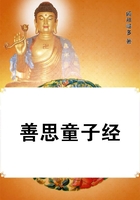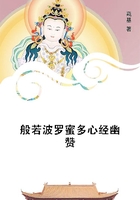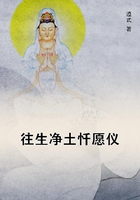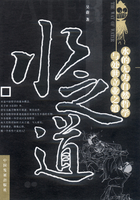No: all stands in that likeness, nothing to be added or taken away; this planning and reasoning is based only on an assumption;things are taken to be in process and this suggests planning and reasoning; insist on the eternity of the process and planning falls to the ground.There can be no planning over the eternal; that would imply forgetfulness of a first state; further, if the second state were better, things stood ill at first; if they stood well, so they must remain.
Only in conjunction with their causes are things good; even in this sphere a thing is good in virtue of being complete; form means that the thing is complete, the Matter duly controlled; this control means that nothing has been left crude; but something is so left if anything belonging to the shape be missing-eye, or other part.Thus to state cause is to state the thing complete.Why eyes or eyebrows?
For completion: if you say "For preservation," you affirm an indwelling safeguard of the essence, something contributory to the being: the essence, then, preceded the safeguard and the cause was inbound with the essence; distinct, this cause is in its nature a part of the essence.
All parts, thus, exist in regard to each other: the essence is all-embracing, complete, entire; the excellency is inbound with the cause and embraced by it; the being, the essence, the cause, all are one.
But, at this, sense-perception- even in its particular modes- is involved in the Idea by eternal necessity, in virtue of the completeness of the Idea; Intellectual-Principle, as all-inclusive, contains in itself all by which we are brought, later, to recognise this perfection in its nature; the cause, There, was one total, all-inclusive; thus Man in the Intellectual was not purely intellect, sense-perception being an addition made upon his entry into birth: all this would seem to imply a tendance in that great Principle towards the lower, towards this sphere.
But how could that Principle have such perception, be aware of things of sense? Surely it is untenable on the one hand that sense-perception should exist There, from eternity, and on the other that only upon the debasement of the soul should there be sense-perception here and the accomplishment in this realm of the Act of what was always a power in that?
4.To meet the difficulty we must make a close examination of the nature of Man in the Intellectual; perhaps, though, it is better to begin with the man of this plane lest we be reasoning to Man There from a misconception of Man here.There may even be some who deny the difference.
We ask first whether man as here is a Reason-Principle different to that soul which produces him as here and gives him life and thought; or is he that very soul or, again, the [yet lower] soul using the human body?
Now if man is a reasonable living being and by "living being" is meant a conjoint of soul and body, the Reason-Principle of man is not identical with soul.But if the conjoint of soul and body is the reason-principle of man, how can man be an eternal reality, seeing that it is only when soul and body have come together that the Reason-Principle so constituted appears?
The Reason-Principle will be the foreteller of the man to be, not the Man Absolute with which we are dealing but more like his definition, and not at that indicating his nature since what is indicated is not the Idea that is to enter Matter but only that of the known thing, the conjoint.We have not yet found the Man we are seeking, the equivalent of the Reason-Principle.
But- it may be said- the Reason-Principle of such beings must be some conjoint, one element in another.
This does not define the principle of either.If we are to state with entire accuracy the Reason-Principles of the Forms in Matter and associated with Matter, we cannot pass over the generative Reason-Principle, in this case that of Man, especially since we hold that a complete definition must cover the essential manner of being.
What, then, is this essential of Man? What is the indwelling, inseparable something which constitutes Man as here? Is the Reason-Principle itself a reasoning living being or merely a maker of that reasoning life-form? and what is it apart from that act of making?
The living being corresponds to a reasoning life in the Reason-Principle; man therefore is a reasoning life: but there is no life without soul; either, then, the soul supplies the reasoning life-and man therefore is not an essence but simply an activity of the soul- or the soul is the man.
But if reasoning soul is the man, why does it not constitute man upon its entry into some other animal form?
5.Man, thus, must be some Reason-Principle other than soul.But why should he not be some conjoint- a soul in a certain Reason-Principle- the Reason-Principle being, as it were, a definite activity which however could not exist without that which acts?
This is the case with the Reason-Principles in seed which are neither soulless nor entirely soul.For these productive principles cannot be devoid of soul and there is nothing surprising in such essences being Reason-Principles.
But these principles producing other forms than man, of what phase of soul are they activities? Of the vegetal soul? Rather of that which produces animal life, a brighter soul and therefore one more intensely living.
The soul of that order, the soul that has entered into Matter of that order, is man by having, apart from body, a certain disposition; within body it shapes all to its own fashion, producing another form of Man, man reduced to what body admits, just as an artist may make a reduced image of that again.
It is soul, then, that holds the pattern and Reason-Principles of Man, the natural tendencies, the dispositions and powers- all feeble since this is not the Primal Man- and it contains also the Ideal-Forms of other senses, Forms which themselves are senses, bright to all seeming but images, and dim in comparison with those of the earlier order.

